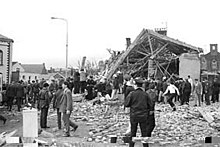| Remembrance Day bombing | |
|---|---|
| Part of the Troubles | |
 The aftermath of the bombing | |
| Location | Enniskillen, County Fermanagh, Northern Ireland |
| Coordinates | 54°20′40″N 07°38′05″W / 54.34444°N 7.63472°W |
| Date | 8 November 1987 10:43 (GMT) |
Attack type | Time bomb |
| Deaths | 12 |
| Injured | 63 |
| Perpetrator | Provisional IRA |
The Remembrance Day bombing (also known as the Enniskillen bombing or Poppy Day massacre)[1][2] took place on 8 November 1987 in Enniskillen, County Fermanagh, Northern Ireland. A Provisional Irish Republican Army (IRA) bomb exploded near the town's war memorial (cenotaph) during a Remembrance Sunday ceremony, which was being held to commemorate British military war dead. Eleven people (10 civilians and a police officer) were initially killed, many of them elderly. A twelfth man was fatally wounded, entering a coma from which he would later die, and 63 were injured. The IRA said it had made a mistake and that its target had been the British soldiers parading to the memorial.
The bombing was strongly condemned by all sides and undermined support for the IRA and Sinn Féin. It also facilitated the passing of the Extradition Act, which made it easier to extradite IRA suspects from the Republic of Ireland to the United Kingdom. Loyalist paramilitaries responded to the bombing with revenge attacks on Catholic civilians.[3] The bombing is often seen as a turning point in the Troubles,[3] an incident that shook the IRA "to its core",[4][5] and spurred on new efforts by Irish nationalists towards a political solution to the conflict.[6]
- ^ Mary Harney (2001). "Dail Remarks by Mary Harney, T.D., Tánaiste and Leader of the Progressive Democrats in Response to the Recent Terrorist Attacks on the United States". DETE press release. Archived from the original on 20 November 2007. Retrieved 7 May 2008.
- ^ Henry McDonald (23 April 2006). "Gadaffi sued by 160 victims of IRA". The Guardian. London. Retrieved 7 May 2008.
- ^ a b McKittrick, David. Lost Lives: The stories of the men, women and children who died as a result of the Northern Ireland Troubles. Random House, 2001. pp.1094–1099
- ^ "Educational Television Programmes for lectures, training seminars and exhibitions" (PDF). BBC Active. 14 September 2010. Retrieved 29 December 2010.
- ^ "Age of Terror" (Television Documentary). BBC. 25 March 2008. Retrieved 7 May 2008.
- ^ Dawson, Graham. Making Peace with the Past?: Memories, Trauma and the Irish Troubles. Manchester University Press, 2007. p.288
